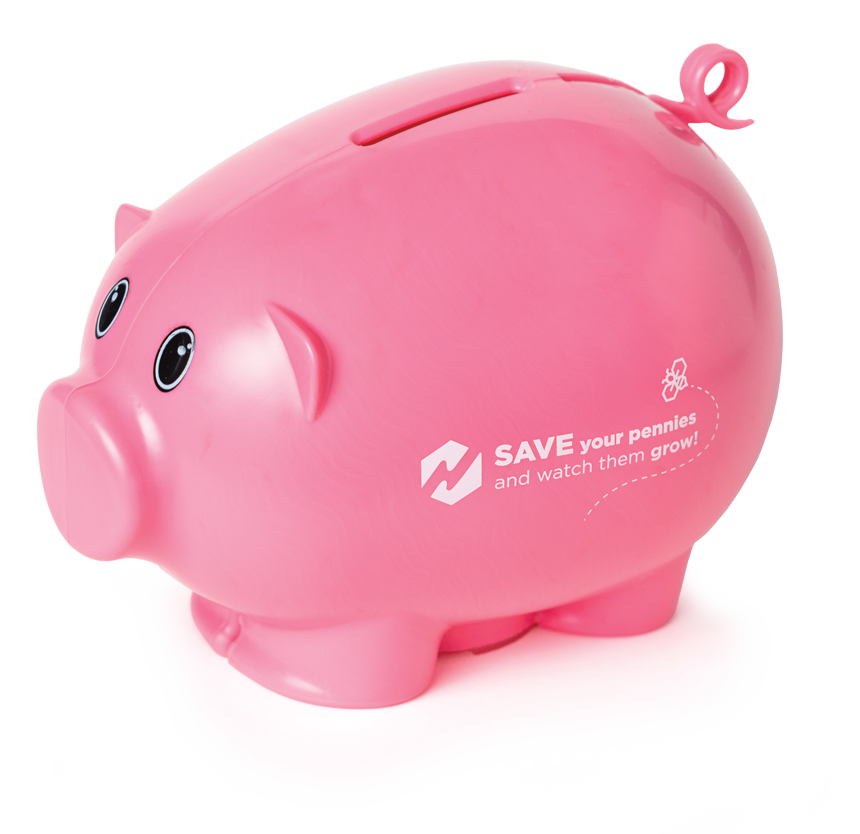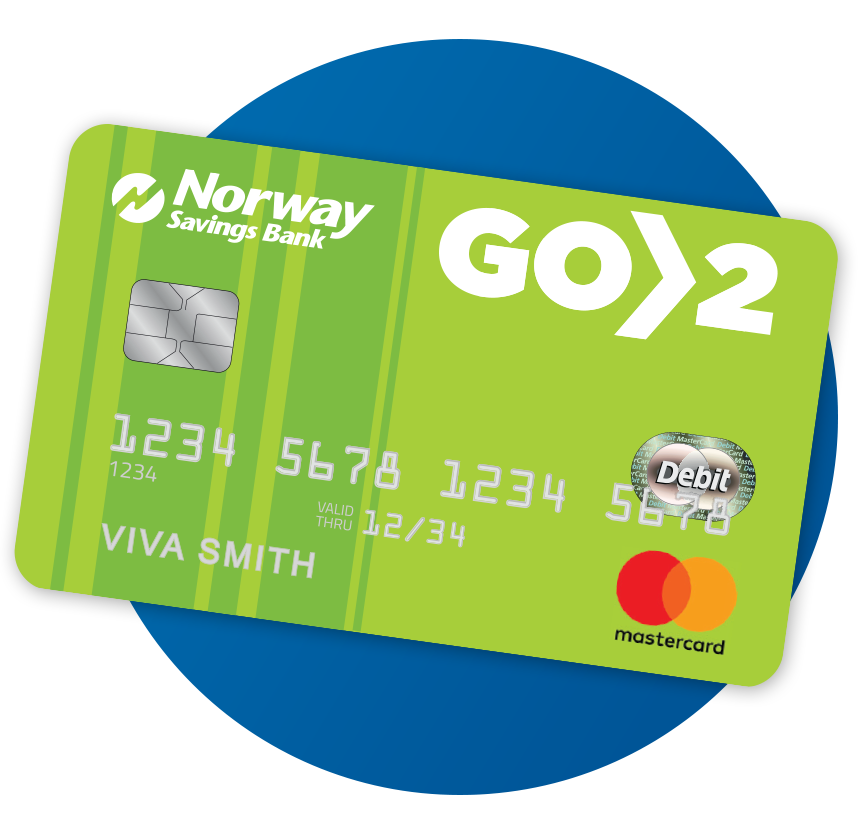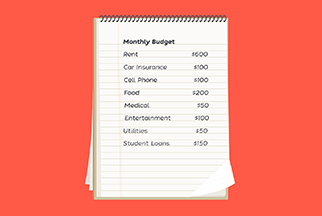With you every step of the way
Ages 3+
Good financial habits start early.
Newsflash: Your babies aren’t babies anymore. Your kids are walking, running, making friends and starting school… Now’s the perfect time to talk to them about saving. So, get your young ones engaged early with our tips on saving, sharing, and spending.
For Kids
Up for a challenge?
Introduce your child to the piggy bank. Start by putting $0.25 into the piggy bank. Each week raise the amount you add to the piggy bank by $0.25. By the end of the year, your child will have raised $344.50. You can then roll and count the coins with them to show how much money they can earn by saving a little bit each week!
Financial challenge for older kids
Let your kid(dos) choose what’s for dinner tonight! Give them a budget they must work with, then help them choose a meal based on their budget. You can then bring them to the store and help them pick out the ingredients for the meal (it is always helpful to make a list and bring a calculator to keep track of their budget!). While at the store, you can educate them on store vs name brand and how to save money on certain items!
Once you are done picking up the ingredients, they can help you prepare the meal and serve it to your whole family!
For Parents
Help build good financial habits
We talk to our kids every day – we ask them about school, about their friends, about sports and even the weather! Talking about money is just as important but how do we get started?
Do they have a toy they really, really want? Or maybe their friend is having a birthday and they want to get them something special. These are great opportunities to talk to them about saving for something they want or need.
Great times to talk to your children about money:
- On payday
- At the grocery store
- When paying bills
- When planning a family vacation
- At your local bank
RESOURCES FOR 3+


Help your child save
Come to any Norway Savings branch to help your child start saving today. Open their first savings account at Norway Savings, and we’ll match up to $15 of their first deposit!1* As a fun reminder to keep saving, we’ll also provide a FREE piggy bank of their very own when they open their first account.

Ages 9+
Saving really adds up!
Time certainly moves fast… your kids are helping out around the house, earning an allowance, getting more independent day by day. It’s time to help your kids make the most of their hard work – and we want to help! So bring your child (up to age 13) to your nearest NSB branch and we’ll provide a one-time match up to $15 when you open their new savings account or make a deposit into an existing savings account in your child’s name.1*
For Kids
Up for a challenge?
Surprise! You just received $50 for your birthday. What are you going to do with it?
- Will you spend it right away?
- Will you put it in your piggy bank to save for something you really want?
- Will you go to the bank and open a savings account?
Now ask yourself these same questions but this time, you had to work to earn the $50. Are your answers the same?
For Parents
Help build good financial habits
Help your child understand the importance of setting goals with their money. Short-term and long-term goals are great to have and best to establish at a young age. Here is a goal setting worksheet to help your child establish and reach their goals.
RESOURCES FOR 9+

Help your child save
Come to any Norway Savings branch to help your child start saving today. Open their first savings account at Norway Savings, and we’ll match up to $15 of their first deposit!1* As a fun reminder to keep saving, we’ll also provide a FREE piggy bank of their very own when they open their first account.
Ages 14+
Help your teen save as they spend
Your kids continue to get more active in earning money – and actively spending, too. This is a great time to encourage responsible spending alongside their saving habits. Check out our tips to encourage your teen to save, and how to make every dollar they earn go as far as it can.
For Kids
Up for a challenge?
At times, technology seems to rule the world. You’re online for school, for work and for play. The Internet is a useful tool – when used properly.
Play it safe with these tips!
- Keep your phone & computer up to date with the latest security software and operating system.
- Establish strong passwords. Don’t share them and don’t use the same password for everything.
- Keep your personal information, personal. Hackers can use social media profiles to figure out your passwords and security questions – don’t feed them this information.
Want more? Check out these 8 Tips for Protecting Yourself Online.
For Parents
Help build good financial habits
It’s hard to believe your child is old enough for their FIRST job!
Here are some tips to help them succeed in the search and landing that job.
- Dress for success. When meeting with a representative from a potential workplace, be sure to wear clean, classy, unwrinkled clothing – no jeans, no holes, no t-shirts.
- Be on time. 5 to 10 minutes early is even better!
- Practice for your interview. Think of questions you want to ask. Have someone interview you with potential questions.
- Be confident. Eye contact is the best way to show your confidence. You can do this – you know what you want, go out there and get it!
RESOURCES FOR 14+


Open a GO>2 account
Make sure to sign your teen up for GO>22—our paperless, checkless checking and savings account that earns your teen 15 cents for every purchase3 using the GO>2 debit card.

Ages 18+
What’s Next?
Are you or a young adult in your life getting ready to attend college or technical school? Join the workforce? Whatever the plan is, there are tools to help. We’ve pulled together some of our favorite resources on personal finance, managing credit card debt, and more. Another great way to encourage saving? The Go>2 account that helps you save as you spend!
For Young Adults
Up for a challenge?
As you head out on your own, it’s time to get smart about credit and managing your expenses. It’s important to know where your money goes and make sure you have enough to cover monthly bills. This budget worksheet will help you break down your expenses and get you on track.
For Parents
Help build good financial habits
Your young adult is making decisions for themselves now but that doesn’t mean you can’t encourage them to make wise financial decisions. Credit cards, they’re useful but not for everyone. Talk to your young adult about credit card use and abuse to help them make choices that will help keep them financially savvy.
Things to talk about:
What type of credit card is best for you? There are so many options available, talk about what benefits make the most sense.
If you’re getting a credit card, how will it be used? Will it only be for emergencies only? Will it be for establishing credit?
Don’t overspend! Just because you have a limit doesn’t mean you need to max it. Only spend what you actually have and can afford to pay off each month.
Pay the bill on time or—even better—right after making the purchase, if you can. This will help to avoid paying too much interest.
Just because you receive multiple credit card offers in the mail, doesn’t mean you need all of them. Stick to only one or two cards to avoid overspending.
RESOURCES FOR 18+

Open a GO>2 account
Make sure to sign up for GO>22—our paperless, checkless checking and savings account that earns 15 cents for every purchase3 using the GO>2 debit card.
Age 3+ and 9+ Disclosures:
1 Offer limited to children ages 3 – 13 years old and for a one-time redemption of up to $15.00 that will be deposited into a new or existing Norway Savings Bank savings account in the child’s name (within five business days). Minimum initial deposit to open a GO>2 Savings Account is $1.00. Depending upon the savings account type you open, fees may reduce earnings.
*The one-time match of up to $15 can only be applied when you open the account or make a deposit in person in a branch.
Age 14+ and 18+ Disclosures:
2Please see branch or www.norwaysavings.bank for complete details regarding opening a GO>2 and associated savings account. Children ages 14 – 17 may open a GO>2 account providing two forms of identification or valid driver’s license.
3You will earn $0.15 per qualified purchase when you use your GO>2 Debit Card. Qualified purchases are for goods and services.
Here for the big days—and everyday
Opening Accounts for Children
Budgeting
Social Media Privacy
The Three-Jar Allowance
Quality vs Cost
Repaying Student Loans
College Budget Breakdown
TAKE CONTROL OF YOUR MONEY WITH

From using credit cards to going to college to buying a home (and more), Banzai provides clear, in-depth lessons that help you dive into the financial topics you care about most.











